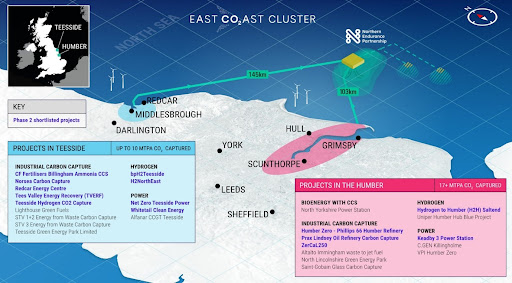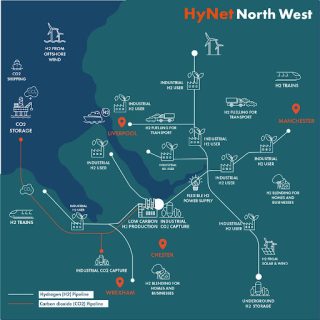-
Eight projects announced in the UK to form the first stage of CCUS enabled decarbonisation clusters
Date posted:
-
-
-
Post Author
Greg Kelsall
-
-

Following the previous publication of the shortlisted 14 power CCUS, industrial carbon capture (ICC), waste and CCUS-enabled hydrogen projects, itself a down-selection from an initial list of 20 projects as report previously by IFRF, the UK’s Department for Energy Security and Net Zero (DESNZ) has now selected 8 projects to proceed to negotiations for support through the relevant Business Models. These are 8 selected projects are:
East Coast Cluster
- Net Zero Teesside Power
- bpH2Teesside
- Teesside Hydrogen CO2 Capture
HyNet Cluster
- Hanson Padeswood Cement Works Carbon Capture and Storage Project
- Viridor Runcorn Industrial CCS
- Protos Energy Recovery Facility
- Buxton Lime Net Zero
- HyNet Hydrogen Production Plant 1 (HPP1)
![]()
The news follows the UK Government’s £20bn investment package into carbon capture and storage through clusters, including East Coast Cluster and HyNet, announced in the Spring Statement earlier in March and is further outlined in the recently released Powering up Britain publication.
According to DESNZ, the 8 projects represent a range of innovative CCUS technologies that have the potential to:
- accelerate the UK’s decarbonisation ambitions;
- realise economic benefits across North Wales, North-West England, and the East Coast of England;
- kick start the hydrogen economy; and
- put the UK on a path to decarbonising its power system by 2035, while maintaining security of supply.
DESNZ stress that the eight named projects do not represent the extent of the UK ambition. A further process will be launched later this year to enable further expansion of the Track-1 clusters, beyond the initial deployment, identifying and selecting projects for HyNet and East Coast Cluster, including the Humber, and their associated stores as they become viable, to be operational by 2030. “We will work to identify projects that could be potential alternatives to any of the initial Track- 1 projects, if any are unable to agree contracts within the criteria and timelines required. The government will continuously monitor the value for money offered by the Track-1 Project Negotiation List, to ensure only the best and most cost-effective projects reach FID. In addition, we are launching Track-2 to identify 2 additional clusters contributing to our ambition to capture 20-30 MtCO2/y across the economy by 2030”.
The announcement further states that “we are also announcing the conclusion of the power BECCS project assessment process. Both projects which made submissions, Drax Power Ltd and Lynemouth Power Ltd, met the minimum criteria for deliverability by 2027. These projects have not been selected for deployment in Track-1 but the department will engage further with these projects following the assessment outcome. Track-1 is not the extent of our ambition and the government remains committed to achieving 5 MtCO2/y of engineered greenhouse gas removals by 2030”.
This is all great news in the move to decarbonise power and difficult to abate industrial processes. Perhaps surprising from the announcement however is the complete exclusion of the Humber related decarbonisation projects from Track-1, with the selected East Coast Cluster projects focusing exclusively on Teesside in the North East. The Humber is after all the single largest cluster by industrial emissions, emitting more than 12 million tonnes of CO2 per year, 50% more than the next largest, thus providing the largest decarbonisation opportunity. The Zero Carbon Humber cluster is a dual carbon capture and hydrogen supply network including Drax, SSE’s Keadby cluster, Scunthorpe steelworks, Uniper’s operations at North Killingholme and Equinor at Saltend Chemical Works amongst others.
As noted earlier in this IFRF blog, the Powering Up Britain publication does however include a pledge to launch a further process later this year to add more projects by 2030, with the Humber specifically referenced- so presumably the Humber projects will be next in the process.

